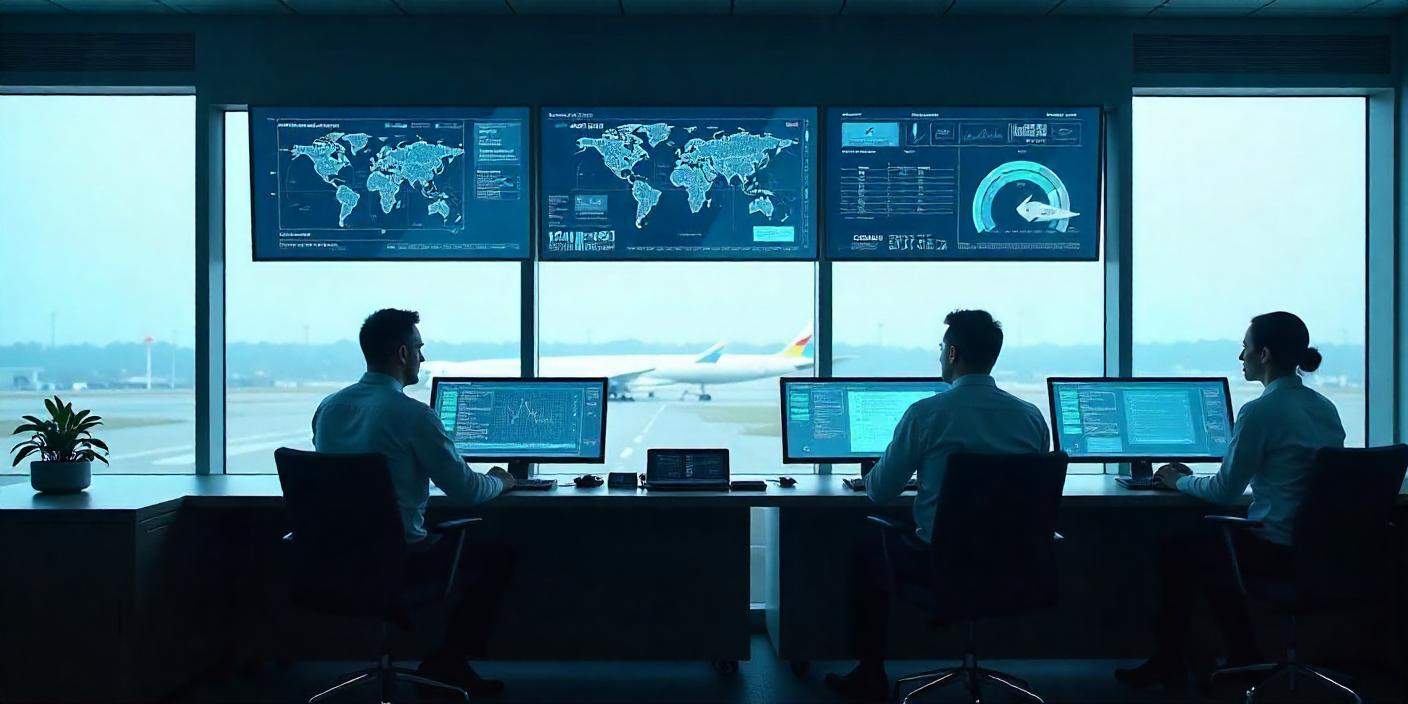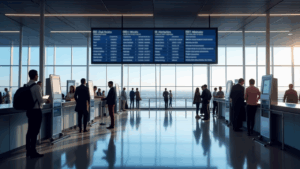Flight disruptions are one of the biggest challenges airlines face, affecting passenger satisfaction, operational efficiency, and revenue. While delays and cancellations may seem inevitable, technology is changing the game. At the heart of this shift is VoyagerAid, an AI-powered disruption management platform built to predict and mitigate irregular operations (IROPs) before they snowball into chaos.
The aviation industry is embracing this technological transformation. Airlines and airports are harnessing the power of big data, machine learning, and artificial intelligence to predict and minimize flight delays. The adoption rate is remarkable: only 3% of airlines said they had no plans to invest in AI technologies, indicating widespread recognition of AI’s potential in disruption management.
So, how exactly does VoyagerAid stay one step ahead of disruption? Here’s a behind-the-scenes look.
Predictive Intelligence That Looks Ahead
VoyagerAid leverages advanced machine learning models that continuously analyze historical data, real-time operational inputs, weather feeds, airport conditions, and air traffic flow. By identifying early warning signs – such as turnaround delays, crew bottlenecks, or weather volatility, VoyagerAid can forecast potential disruptions with remarkable accuracy.
The predictive approach addresses a significant industry challenge. Industry researchers estimate a $60 billion annual impact to the travel industry and to corporate productivity from irregular operations. By moving from reactive to proactive management, airlines can substantially reduce this impact.
The result? Airlines are no longer caught off-guard. With early predictions, they can proactively activate response protocols before the impact hits, transforming disruption management from crisis response to strategic planning.
Real-Time Decision Support
Predicting a disruption is only part of the solution. VoyagerAid pairs prediction with real-time decision support, offering operations teams clear recommendations based on available aircraft, crew schedules, gate constraints, and passenger itineraries.
These AI-suggested actions help ops teams resolve conflicts faster, reallocate resources efficiently, and minimize the ripple effect of delays. The system considers multiple variables simultaneously, providing optimized solutions that human operators might not identify under time pressure.
Modern machine learning approaches have proven effective in this domain. Research shows that supervised machine learning models can successfully predict flight delays by analyzing factors such as departure airports, weather conditions, and historical patterns, enabling more informed decision-making.
Seamless Passenger Re-Accommodation
When a disruption is unavoidable, speed and clarity in passenger handling make all the difference. VoyagerAid enables automated passenger rebooking and instant communication via SMS, email, or app notifications reducing confusion and complaints at the gate.
With this automation, airline teams can handle large-scale disruptions with minimal manual intervention, ensuring that affected passengers are kept informed and offered options promptly. This proactive communication strategy significantly reduces the burden on customer service teams and improves overall passenger experience.
The integration of passenger management with predictive analytics creates a comprehensive approach to disruption handling that addresses both operational and customer service challenges simultaneously.
Continuous Learning and Improvement
VoyagerAid’s models don’t just learn once, they evolve. After every disruption, the system captures outcomes, evaluates decision accuracy, and fine-tunes its prediction logic. This feedback loop ensures VoyagerAid becomes smarter over time, adapting to each airline’s unique operational patterns.
This continuous improvement approach is essential in the dynamic aviation environment where operational patterns, weather conditions, and passenger behaviors constantly evolve. The system’s ability to adapt to changing conditions ensures that predictions remain accurate and relevant.
Machine learning algorithms analyze historical patterns to identify optimal recovery strategies, helping operations teams make more informed decisions based on what has worked effectively in similar situations.
The Technology Behind the Prediction
VoyagerAid employs multiple data sources and analytical techniques to achieve accurate predictions:
Multi-Source Data Integration
The platform combines weather data, air traffic control information, airport operational status, aircraft maintenance schedules, crew availability, and historical performance patterns to create comprehensive situational awareness.Advanced Analytics
Machine learning algorithms process this data in real-time, identifying patterns and correlations that indicate potential disruptions. The system can detect early warning signs that might not be apparent to human operators.Scenario Modeling
VoyagerAid runs multiple scenarios to predict how disruptions might unfold, allowing operations teams to prepare contingency plans and allocate resources accordingly.
Operational Benefits
The shift to predictive disruption management delivers measurable benefits:
Reduced Operational Costs
By preventing disruptions rather than reacting to them, airlines can avoid the cascading costs of delays, cancellations, and passenger compensation.Improved Resource Utilization
Predictive insights allow better planning of aircraft, crew, and ground resources, reducing waste and improving efficiency.Enhanced Customer Experience
Proactive communication and faster resolution times lead to higher passenger satisfaction and reduced complaints.Operational Resilience
Airlines with predictive capabilities can maintain schedule integrity even during challenging conditions, building reputation and customer loyalty.
Industry Impact and Future Outlook
The adoption of AI-powered disruption management is transforming how airlines approach operational challenges. Artificial Intelligence (AI) and Machine Learning (ML) are revolutionizing airports with remarkable advancements. By optimizing flight schedules, enhancing air traffic management, these technologies are becoming essential tools for modern airline operations.
The trend toward proactive disruption management represents a fundamental shift in airline operations philosophy. Rather than accepting disruptions as inevitable, airlines are investing in technologies that can predict and prevent them.
VoyagerAid: Leading the Predictive Revolution
VoyagerAid represents the next generation of disruption management technology. By combining advanced predictive analytics with real-time operational support, the platform enables airlines to stay ahead of disruptions rather than constantly reacting to them.
The system’s comprehensive approach addresses every aspect of disruption management from early detection and prediction to passenger communication and recovery planning. This holistic solution ensures that airlines can maintain operational excellence even in challenging conditions.
Conclusion
In a world where operational certainty is rare, VoyagerAid equips airlines with predictability, agility, and control. By moving from reactive firefighting to proactive planning, airlines can improve on-time performance, elevate the passenger experience, and reduce the cost of disruption.
The future of airline operations lies in predictive intelligence and proactive management. Airlines that embrace these technologies today will be better positioned to deliver reliable service while maintaining operational efficiency and cost control.
Want to see how VoyagerAid can work for your airline? Let’s schedule a personalized walkthrough to explore how predictive disruption management can transform your operations.






